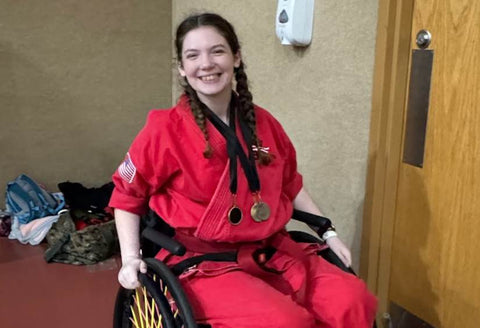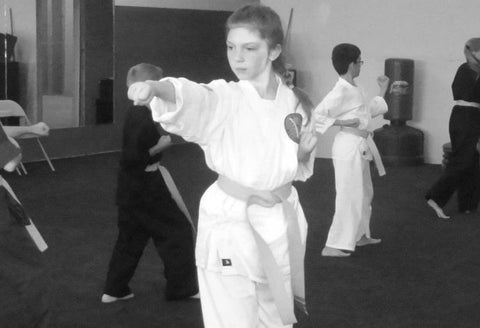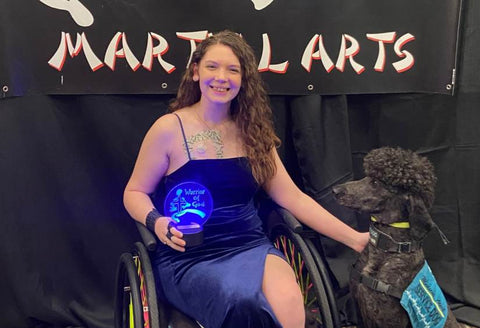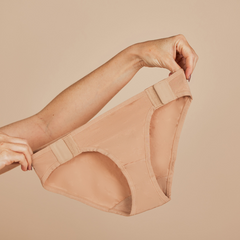
Nicole: I know a little bit about you, but I would still appreciate it if you could just tell us more about yourself.
Brie: My name is Brie, I'm 23 years old and from a tiny town in East Texas. I'm a third-degree red belt in American Taekwondo and I have a genetic condition called Classical Ehlers Danlos Syndrome (EDS). Complications from my EDS have led me to become a full-time wheelchair user for almost a year now.
The most important things in my life are my God, my family and friends, my dogs and of course martial arts. Advocacy for my condition is also something that is extremely important to me.
Nicole: I'm so curious, I didn't realize you did Taekwondo. As far as I'm aware, Taekwondo requires a lot of grappling. How do you manage that?
Brie: Traditional taekwondo can. I do American Taekwondo, so we take a little bit from other martial art styles and combine it all together. Specifically, we are a mix of progressive American TKD, Japanese Jujitsu and Shotokan. But yes, I do some grappling on the floor.
I've been playing around with it, because as important it is for me to learn how to fight in my wheelchair, it's a very real possibility that in a real-life scenario, someone just pulls me out of it. So, I've been practicing on being able to fight, even if I am on the floor. It's been really fun.
Nicole: That's awesome. And what drew you to martial arts to begin with?
Brie: I originally began martial arts when I was a child, prior to me becoming disabled. It was something my whole family did together and I believe it was really beneficial in shaping me into who I am today.
I moved away from martial arts because of life circumstances, but I had the opportunity to come back almost a year ago, and so I did. When I came back, I was disabled by my EDS, but I could still walk at the time.
Once I lost that ability to walk, I decided that I didn't want to stop. So, we found a way where I didn't have to stop. We've been able to adapt [the moves] so that I can continue my martial arts journey.

Nicole: How have you adapted it? What are the most common or even innovative ways?
Brie: Adapting my techniques and katas and everything is challenging, but we've been able to figure it out. My instructors are really great at helping me adapt things. They'll even pull a chair up onto the floor with me so they can sit down and figure out how something would be done seated.
I really enjoy understanding the reason behind the movements that we're trying to adapt, so that we can preserve the original purpose behind the movement. That's especially important in things like katas and self-defense.
One really cool adaption I've enjoyed is weapons. Traditionally, martial arts weapons came from what was around you. Typical weapons weren't allowed so they made due with what they had. For example, some weapons we use today come from the scythes that were used for cutting rice.
I use the arms of my wheelchair. I pulled them off and used them as weapons. Why? Because it goes back to the original purpose of using what is around you, and my wheelchair is always with me.
Nicole: That's amazing. I can see behind you that you have many medals. Could you tell me more about the different competitions?
Brie: Yes, I've just started going to competitions or tournaments is what we call them. My first one was in October, so it's new for me. Some tournaments have divisions specifically for people with disabilities, but often I’m the only one in that category. More often than not, I like to compete with non-disabled people in my normal age category.
I like competition, so if I'm going get a medal, I want to earn it.

Nicole: And what advice would you have for people who are disabled, and obviously there's a wide variety of disabilities, but who are disabled and might want to look into martial arts?
Brie: My advice for others is to just try it. Don’t give up on what you love.
I constantly get comments on my Tik Tok and my Instagram of people that don't even realize that martial arts is an option for them, because they use mobility aids or they have other disabilities.
Martial arts is so good for your body, both mentally and physically. Even if it does hurt you sometimes, it's worth it. It teaches strength, respect, integrity, and confidence in yourself.
And especially with disabled individuals being at a higher risk for experiencing violence than our non-disabled peers, it's so important for us to learn how to protect ourselves.
Nicole: What motivates you to practice? You said you left the sport and then you came back to it.
Brie: My support system that I have is paramount. I'm super grateful that I have such amazing friends and family both in my dojo and out of it.
It's the confidence it has given me after losing the ability to walk and feeling like I'm losing all of these things, and then continuing martial arts and showing that it’s something that I can still do. And to show other people that they can do it too. It's so cool.
Nicole: Okay, that's wonderful. My last question is: what brings you joy?
Brie: I think I do my best to find joy in everything. It's my belief that joy is choosing to respond to my circumstances with gratification and contentment because I know that my God uses my experiences to accomplish his work in and through my life.
And I find joy in that even if I'm going through trials and hard things. If I'm having trouble with my health, and other aspects of my life, all of it is being used and I've been able to see that through my martial arts journey.
I recently was at a Warrior of God tournament and banquet, and I was able to receive an award for the most amount of points in my age and rank category, to be specific. And it was cool to be able to see how that all works out.
Nicole: Thank you for talking to me!
You can follow Brie's journey on her Instagram.



